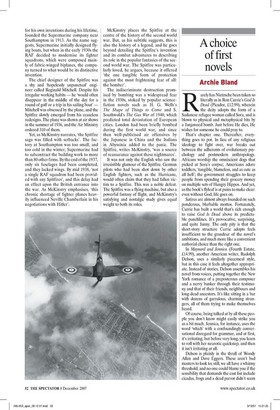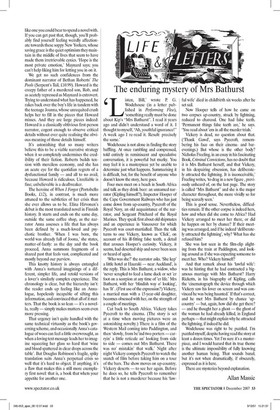A choice of first novels
Archie Bland Rarely has Nietzsche been taken so literally as in Ron Currie's God Is Dead (Picador, £12.99), wherein the deity adopts the form of a Sudanese refugee woman called Sora, and is blown to physical and metaphysical bits by a Janjaweed bomb. Just before He dies, He wishes for someone he could pray to.
That's chapter one. Thereafter, everything goes to pot. In lieu of any religious ideology to fight over, war breaks out between the adherents of evolutionary psychology and postmodern anthropology. Africans worship the omniscient dogs that picked at Sora's corpse; Americans adore toddlers, 'tangible, blameless, and as cute as all hell'; the government struggles to keep people from spending their grocery money on multiple sets of Hungry Hippos. And yet, as the book's flyleaf is at pains to make clear: even without God, life goes on.
Satires are almost always founded on such ponderous, blurbable mottos. Fortunately, Currie has built a world that's rich enough to raise God Is Dead above its predictable punchlines. It's provocative, surprising, and quite funny. The only pity is that the short-story structure Currie adopts feels insufficient to the grandeur of the novel's ambitions, and much more like a convenient authorial choice than the right one.
In Maynard and Jennica (Fourth Estate, £14.99), another American writer, Rudolph Delson, uses a similarly piecemeal style, but in this case it feels altogether appropriate. Instead of stories, Delson assembles his novel from voices, putting together the New York romance of a preposterous composer and a nervy banker through their testimony and that of their friends, neighbours and long-dead ancestors. It's like sitting in a bar with dozens of garrulous, charming strangers, all of them trying to make themselves heard.
Of course, being talked at by all these people you don't know might easily strike you as a bit much. Jennica, for instance, uses the word 'which' with a confoundingly conversational disregard for grammar, and at first, it's irritating; but before very long, you learn to roll with her neurotic quickstep, and then it isn't irritating at all.
Delson is plainly in the thrall of Woody Allen and Dave Eggers. These aren't bad masters to look to; still, we all have a whimsy threshold, and no one could blame you if the sensibility that demands the cast list include cicadas, frogs and a dead parrot didn't seem like one you could bear to spend a novel with. If you can get past that, though, you'll probably find yourself feeling weirdly affectionate towards these soppy New Yorkers, whose saving grace is the quiet optimism they maintain in the middle of lives that seem to have made them irretrievable cynics. 'Hope is the most private emotion,' Maynard says; you can't help liking him for letting you in on it.
We get no such confidences from the dominant narrator of Bethan Roberts' The Pools (Serpent's Tail, £10.99). Howard is the creepy father of a murdered son, Rob, and as acutely repressed as Maynard is extrovert. Trying to understand what has happened, he rakes back over the boy's life in tandem with the teenage Joanna, whose unrequited crush helps her to fill in the pieces that Howard misses. And they are large pieces indeed: Howard is a classically oblivious first-person narrator, cogent enough to observe critical details without ever quite realising the obvious meaning of those details himself.
It's astonishing that so many writers believe this to be a viable narrative strategy when it so completely undermines the credibility of their fiction. Roberts builds tension with merciless economy, and she has an acute eye for the quotidian regrets of a dysfunctional family — and all to no avail, because Howard is ridiculous. Unreliable is fine; unbelievable is a dealbreaker.
The heroine of When I Forgot (Portobello Books, £12), in contrast, is much more attuned to the subtleties of her crisis than she ever allows us to be. Elina Hirvonen's debut is the most translated novel in Finnish history. It starts and ends on the same day, outside the same coffee shop, as the narrator Anna assesses a life that has always been defined by a much-loved and psychotic brother. 'When I was born, the world was already full of Joona,' she states, matter-of-factly: as the day and the book proceed, Anna summons fragments of a shared past that feels vast, complicated and mostly beyond our purview.
This knotty history is always entangled with Anna's tortured imaginings of a different, simpler life, and retold versions of a lover's similarly complex experience. The chronology is clear, but the hierarchy isn't: the reader ends up feeling like an Annalogue, hopelessly incapable of sifting this information, and convinced that all of it matters. That the book is so lean — it's a novella, really — simply makes matters seem even more pressing.
That urgency isn't quite handled with the same technical virtuosity as the book's governing scheme, and occasionally Anna's catalogue of woes can feel a little overwrought, as when a loving text message leads her to imagine squeezing her glass so hard that 'wine and blood spattered in clear drops across the table'. But Douglas Robinson's fragile, spiky translation suits Anna's perpetual crisis so well that it's hard to object. If anything, it's a flaw that makes this a still more exemplary first novel: that is, a book that whets your appetite for another one.


























































 Previous page
Previous page